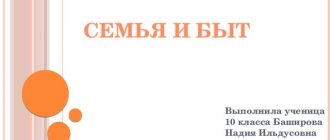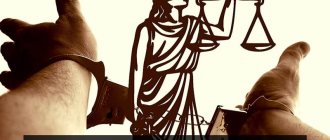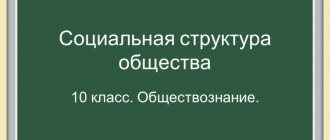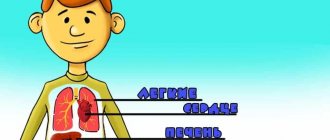Summary and presentation of a lesson on Orkse in grade 4 “Freedom and responsibility”
Sergienko Marina
Summary and presentation of a lesson on Orkse in grade 4 “Freedom and responsibility”
Municipal educational institution -
Secondary school No. 4 Marx Saratov region
Lesson on the subject:
FUNDAMENTALS OF RELIGIOUS CULTURES AND SECULAR ETHICS
MODULE “FUNDAMENTALS OF SECULAR ETHICS”
4 Class
Topic: Freedom and responsibility
Performed:
teacher of the highest qualification category Sergienko Marina Petrovna
Academic year 2017
Technological map of lesson No. 11
according to the course “ ORKSE . Fundamentals of secular ethics"
Teacher Sergienko Marina Petrovna School Municipal Educational Institution-Secondary School No. 4 of Marx
ORKSE subject . Fundamentals of secular ethics Class 4 "b"
topic Freedom and responsibility
Planned educational results
Subject Metasubject Personal
Understanding the relationship between freedom and responsibility , forms of responsibility and informed choice.
Clarify the meaning of the concept of “ freedom ”
,
“choice”
,
“
responsibility ” P. Development of the ability to highlight the main thing in the text in
accordance with the educational task . Establish cause-and-effect relationships between a person’s freedom of choice and responsibility for one’s choice .
R. Formation of the ability to evaluate forms of behavior in relationships with classmates , friends, and adults.
K. Development of cooperation skills in the process of group work; formation of readiness to listen to the interlocutor, conduct a dialogue, recognize the possibility of the existence of different points of view and the right of everyone to have their own position. Development of independence and personal responsibility for one’s actions based on ideas about moral standards.
Developing the ability to evaluate one’s behavior and take responsibility for one’s actions .
Forming a respectful attitude towards the interests, values, and freedom of other people .
Purpose of the lesson To make students realize that everyone is responsible (even if they are free )
for the consequences
of free choice and action.
Basic concepts studied in the lesson Freedom , responsibility , consequences.
ICT tools used in the lesson Multimedia projector, screen, laptop.
Resources used in the lesson (information, literature, art)
Epigraph by Tatiana Yaroshevich, definition by Charles Louis de Seconde de Montesquieu, proverb
“The word is not a sparrow, if it flies out, you won’t catch it!”
.
Organizational structure of the lesson
Stage 1. Entering into the topic of the lesson and creating conditions for conscious perception of new material
Duration of the stage Basic forms of work for teachers and students Formed UUD
6 minutes Emotional mood for the lesson . Checking readiness for the lesson .
— Imagine: a warm summer day, a flowering meadow, butterflies fluttering around... You stand with your arms outstretched wide, your gaze is directed upward to the bottomless blue sky, putting your face up to the sun, breathe deeply and feel lightness, freedom and the desire to explore the world.
Today there are many guests at our lesson . Let's silently send them impulses of goodwill. I hope that today's lesson will bring us all joy in communicating with each other. Good luck to you!
Crawl. Go. Run. Fly. Pursuit. Believe and want. Forget. Get tired. Freeze. Stand. Moping. Give in. Fade away. Two choices. And two destinies. Well, you decide the outcome. Tatiana Yaroshevich
Questions:
- How do you understand these words? What do you think they might have to do with our lesson ? Try to formulate the topic of the lesson .
The teacher opens the topic: Freedom and responsibility .
of the lesson in your notebooks .
Please note that you have assessment sheets for class . Complete them during the lesson . New topic. Introductory conversation with students. Raise your hand, who wants to be free ? What does it mean to be free ? Remember what freedom ? We talked about this in the last .
Freedom is a person’s ability to act in accordance with his interests and goals, to make choices. Freedom is the ability of a person to determine his behavior taking into account the laws of nature and society. Charles Louis de Seconde de Montesquieu, a French writer, lawyer and philosopher, gave the following definition: Freedom is the right to do everything that is not prohibited by law.
How do you understand his words?
Today we’ll talk about how to learn to take responsibility for ourselves and those around us. You will find out what responsibility people bear , even when they are free , and what they need to be responsible . Let's answer the question : “Is responsibility to the need and ability of a person to make the right and free choice ”?
Checking homework. You were asked to remember heroes from fairy tales who were faced with a moral choice. Give your own examples. What did the heroes do in different situations? What would you do?
Volitional self-regulation, acceptance and maintenance of the learning task (R)
Extracting the necessary information from texts (P)
Conscious construction of speech statements, expressing one’s own opinion (K)
Planning educational collaboration with the teacher (K)
Conscious construction of a speech utterance in oral form (P)
Stage 2. Organization and self-organization of students in the course of mastering the material. Organization of feedback
Duration of the stage Basic forms of work for teachers and students Formed UUD
14 minutes Working with a literary text by role (PARABLE)
.
A boy was walking along the road. He looks and the penny is lying there. “Well,” he thought, “even a penny is money!”
He took it and put it in his wallet. He goes further and thinks: “What would I do if I found a thousand rubles? I would buy gifts for my father and mother!” As soon as I thought this, I felt that my wallet seemed to have become thicker. I looked into it, and there was a thousand rubles. "Strange affair! — the boy was surprised. – It was one kopeck, and now it’s a thousand rubles! What would I do if I found ten thousand rubles? I would buy a cow and feed my parents milk!” He looks, and he already has ten thousand rubles! "Miracles! - the lucky guy was delighted, - What if I found a hundred thousand rubles? I would buy a house, take a wife and settle my old people in a new house!” He quickly opened the wallet and saw: there were a hundred thousand rubles! Then he began to think: “Maybe I shouldn’t take my father and mother to the new house? What if my wife doesn't like them? Let them live in the old house. And keeping a cow is troublesome; I’d rather buy a goat. But I won’t buy many gifts, and the expenses are already high...” And suddenly he feels that his wallet has become light, very light! I got scared, opened it, and lo and behold, there was only one penny lying there, all alone...
— Why do you think the money disappeared? Was the guy thinking right? What would you do in his place?
Working with the textbook
- Find in the text of the textbook a definition of what responsibility . ( Responsibility is a character trait of a person and his actions, which indicates that a person is responsible for his own free choice )
— Try to explain the meaning of the word “ responsibility ”
.
— What do you imagine when you hear the word “ responsibility ”
?
What does it look like to you? What thoughts do you have in connection with it? Write down in your notebooks the definition of what responsibility .
Work in pairs. Read page 24 and find out what conditions exist for responsible behavior (aloud)
. Give your own examples.
1. Responsibility only for those actions that are the result of his free choice . 2. Intentionality. (Premeditated, deliberate. Ozhegov)
3. Be aware of the consequences of the actions taken.
Frontal work. Read page 25, 1 paragraph. —What is a person’s internal duty? Why should each of us be able to ask ourselves such questions? Read it. Page 25, 2 paragraph.
Conscious construction of a speech utterance in oral form (P)
Acceptance and retention of the learning task (R)
Search for necessary information, its interpretation, generalization and structuring, analysis and explanation of concepts (P)
Development of cooperation skills in the process of group work, the ability to participate in collective discussion, take into account the opinions of others, and correctly defend one’s opinion (K)
Stage 3. Workshop
Duration of the stage Basic forms of work for teachers and students Formed UUD
10 minutes Group work. Table " Responsibility "
Who is responsible ? People: person, parents, children, teachers, etc.
To whom is he responsible ? In front of nature, in front of society, in front of each other.
What is he responsible ? For decisions, actions and actions
Define the responsibility relationships and fill out the table . Comment on your posts. Each group responds , others comment and agree. What conclusion can be drawn? Conclusion: Everyone’s responsibility is different . It depends on age and on what position a person occupies in society. Parents are responsible for their children , and children are responsible for the tasks assigned to them. Teachers are responsible for how students learn, and students are responsible for how they learn. People are responsible not only for each other, but also for everything that surrounds them, including nature. This meaning of moral responsibility is very close to the concept of care.
Physical education minute. Game “I can and I do”
.
Stand up. Answer questions amicably . And if you don’t agree with the answer , then clap your hands.
Questions:
-Do you know how to dress yourself? — Do you always dress yourself? - Do you know how to give thanks? - Do you say thank you and say thank you? when it is necessary? — Do you know how to put away your things? — Do you put away the toys yourself? -Can you scream? — Did you shout at school today? - Can you push and - Did you do this today? tease your comrades? -Can you be lazy? — Were you lazy in class ? - Do you know how to care for - Does your mother do this for you? your pets? Using this game as an example, try to explain how the concepts “I can”
and
“Doing”
?
Ability to work in pairs, development of cooperation skills; formation of readiness to listen to the interlocutor, conduct a dialogue, recognize the possibility of the existence of different points of view and the right of everyone to have their own position (K)
Stage 4. Checking the results. Correction
Duration of the stage Form for checking the results obtained, making corrections Formed UUD
10 minutes How can the proverb “The word is not a sparrow, if it flies out, you won’t catch it!”
be related to the topic of today's
lesson ?
- Any action entails any consequences. Let's look at a few situations. Read the text, discuss in groups and express your arguments. 1st situation.
Kostya decided to skip class because he had not completed his homework and asked Denis to tell the teacher that he was sick. What will be the consequences of Kostya’s action?
2nd situation.
After school, Sveta went for a walk with the girls without going home and did not notify her parents. When she arrived home, it was already completely dark. The parents were very worried.
3rd situation.
You are traveling on public transport and notice a strange man who is trying to secretly place a package under the seat. Suddenly he realizes that you are watching him closely. He looks at you menacingly, making it clear that he is ready to harm you. He's really dangerous for you. What will you do?
4th situation.
Igor and Dima were riding bicycles and rode out onto the road. What could be the consequences of this action for the boys?
Conclusion: It is important to anticipate the impact of your actions on other people.
Freedom without responsibility is a road to nowhere . A free person is distinguished by the fact that he is ready to take responsibility for his choices , without shifting the blame for the consequences to others. Before declaring your right to freedom , ask yourself a question: what will be the consequences of my freedom for me and the people around me.
Formulation of conclusions based on situation analysis (P)
Establish cause-and-effect relationships between a person’s freedom of choice and responsibility for one’s choice (P)
Formation of the ability to evaluate forms of behavior in relationships with classmates , friends, adults (R)
Stage 5. Summing up, homework
Duration of the stage Reflection on achieved or unachieved educational results Formed EUD
4 minutes
Our lesson is coming to an end .
I ask you to complete the statements about today's lesson : Today I learned... It was difficult... I realized that... a lesson for life... I wanted...
Guys, complete filling out your self-assessment sheets and hand them over to your teacher at the end of the lesson . Evaluate your work in class using emoticons located on your tables. Pay attention to their meaning.
Green – it was interesting, I understood everything, it worked well. Yellow – I didn’t understand something, I still have questions. Red – it was not interesting, boring, I didn’t understand anything. You can draw a smiley like this in your notebook. Thank you guys for your active work in class . Group reflection (K)
Homework 1 minute Differentiated homework: Read Antoine de Exupéry’s fairy tale “The Little Prince” and discuss with your parents: “How to learn to be responsible ?”
“Freedom and responsibility” lesson plan on orxe (4th grade) on the topic
Lesson summary on the basics of secular ethics with children with disabilities in the 4th grade.
Topic: Freedom and responsibility
Objectives: to give the concept of “responsibility”,
develop the ability to distinguish responsible behavior from
irresponsible,
develop a moral personality
Equipment: laptop, multimedia installation, electronic supplement to the textbook “Fundamentals of Religious Cultures and Secular Ethics. Secular ethics. 4th grade"
During the classes.
- Organizing time
- Checking homework
— In the last lesson, we studied the topic “Freedom and moral choice.” Who did you tell about what you learned in class? Who did you discuss this topic with?
- Let's remember what “freedom”, “moral choice” means.
Children's answers
—Have you ever found yourself in a situation of moral choice? Give your examples
Children's answers
Conclusion: From your life situations it is clear that each of you often finds yourself in a situation of moral choice, and in order to do the right thing, virtuously, you definitely need to weigh everything, think, and then make a decision
- Learning new material
- Lesson topic message
“Today we will learn to take responsibility for ourselves and those around us.”
— Please read the topic of the lesson
"Freedom and Responsibility"
- Target setting
— What goals will we set for ourselves?
Reading in the textbook p.24
— We will continue the conversation about freedom, find out what responsibility people bear, what we need to be responsible for
- Working with statements
— Let's turn to “Wise Thoughts”
Textbook p.25
FREEDOM IS RESPONSIBILITY. THAT'S WHY THEY ARE SO AFRAID OF HER. B.SHOW
- How do you understand this statement?
Taking responsibility is not easy
difficult, you need to learn it
A PERSON TRUE BECOMES A HUMAN ONLY AT THE MOMENT OF MAKING A DECISION. P. TILLICH
Each person must make such decisions
that do not harm other people
- Working with the textbook
- Read paragraph 1 of the article.
— Please find out what responsibility is
Responsibility is a personality trait
and her actions, which suggests that the person
responsible for his own free choice
— What do you think are the main, key words in this concept?
Presentation (electronic supplement to the textbook) slide No. 1
— In other words, we can say that responsibility is the need to give an account of one’s actions, actions, as well as the obligation to be responsible for their possible consequences
(writing the concept in a notebook)
— Have we achieved our first goal?
- Physical education minute
- Group work
- Read and find out what conditions exist for responsible behavior. Give your own examples for each condition.
Group 1: Responsibility only for those actions
which are the result of his free choice;
Group 2: Intentionality (premeditated,
intentional act);
Group 3: Be aware of the consequences
actions taken
- Presentation 2-3 slides
— Guys, have we achieved the second goal set for us?
- Inner Responsibility of Man
- Before doing something, a person should think: “What consequences will my action lead to?”, “Will I harm someone?”
- Why do you think each of us should be able to ask ourselves these questions?
To avoid committing vicious acts
— The ability to ask oneself such questions is an internal responsibility of a person. It testifies to his responsibility to himself and other people.
- Responsibility Relationships
— Speaking about responsibility, it is important to understand who, to whom and for whom or for what is responsible.
— Of course, everyone’s responsibility is different. It depends on age and on what place a person occupies in society
- Presentation. Slides 4-6
— Determine the relationships of responsibility and fill out the table (independent work)
| Who? | For what or for whom? |
| Parents | |
| Teachers | |
| Children | |
| Students | |
| Friend | |
| Human |
— Checking the completion using a presentation (Appendix 1)
- Questions and tasks p.25
- Testing on a computer (4 questions from the “Control” section)
- Lesson summary
- Is it easy to be free?
— What is a responsible person like?
- Homework
— Read an excerpt from V.A. Sukhomlinsky’s story “How to Raise a Real Person” and try to answer the question: what should you be like for your parents to be truly happy and proud of you?
The greatest happiness for your father and mother is your honest life, hard work, and during your school years, diligence in your studies. Bring joy to the house, protect the happiness of the family.
If people consider you a bad person, this is a great grief for your mother and your father.
Truly loving your father and mother means bringing peace and tranquility to your home.
Cherish the honor of your family. Know that your family is not just your father and mother. This is you too, children. This is your behavior, your actions. One must be truthful with all people, but for a mother and father, the slightest drop of a lie, if only they value their honor, is a great misfortune.
Ask your father and mother for permission and permission for things that cannot be done without their will. The true freedom of a son and daughter is to be obedient children. Submission to the will of your parents is the first school of civic education, your conscience. If you have not learned to obey the will of your parents and see your true freedom in this submission, you will not be able to become a faithful father of your children, a loving mother, a real person.
QUESTIONS:
1. What should you be like for your parents to be truly happy and proud of you?
2. What is the true freedom of a son and daughter?
3. What does it take to become a real person?





